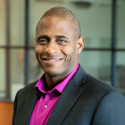Winter commencement: Transcript of address Gaddi Vasquez
Charge to graduates
Delivered by U.S. Peace Corps Director Gaddi Vasquez
University of Wisconsin–Madison
Sunday, Dec. 19, 2004
Graduates of the 2004 class of this great University of Wisconsin — congratulations on your graduation! I thank you for inviting me today to be with you, and I know how proud you must feel at this moment. I’m delighted to join you on this festive occasion. I must confess that coming to the number one Peace Corp-producing university in the nation is one of the finer honors and opportunities that I have had, and I salute the University of Wisconsin.
I’ve been privileged to deliver a number of commencement addresses, and I might add that last Monday I spoke at Chaminade University in Honolulu, Hawaii, which is a little different in climate than today. But I’ve learned that when you are the person that stands between graduates and their diplomas, it is imperative that I speak and then get out of the way, and that is exactly what I intend to do today.
Before I sit down, I do have a few thoughts that I’d like to share. I’d like to start off by acknowledging those who need to be thanked, and there are many who worked to get you to this day of graduation. So graduates, let’s hear it for the parents! They’re worthy! The parents who are here today are breathing a collective sigh of relief – no more checks to write for tuition, books, housing or other assorted expenses. When our son graduated, we felt like we had gotten a pay raise. But now the only fear that your parents have is that you’re going to move back home. Your siblings are happy, too, but they’re fearful that you may return home and reclaim the real estate they inherited when you departed.
As I look across this gathering today, I reflect on the day that I graduated. I was the first person to graduate from a university or college anywhere in the history of my family. It was a special moment for my family. I was a child of migrant farm workers – parents who harvested the fields and the crops in the Midwest, in Texas and California — so you can imagine the honor and pride that my parents had on the day that I graduated from college.
My parents taught me the value of life, family and faith. They also engrained in me the value of hope – a hope that I could be anything I wanted to be, because this was the United States of America.
You need to understand that neither of my parents graduated from high school, and I have great respect for my mother — even more so now that we are the parents of a 25-year-old college graduate – because in my learning years, my parents were great disciplinarians, special in the way they raised us up.
Unlike a modern-day parent, when we were raising our child, when he wasn’t focused on homework, we used incentive packages, we negotiated, we mediated, we arbitrated, we bought parenting books, we bought self-help tapes, we consulted folks on how to motivate children to achieve great, great academic results. But when I was growing up, my mother was not into self-help or psychology, she was not into tapes or books, she was not into consulting people. When we didn’t want to do our homework, she simply went out into the yard, broke a branch off of a tree and took the leaves off of the branch and came at us.
Now some people said, “Well, it sounds to me like you were an abused child.” No, I was not an abused child. I was a highly motivated child. My mother’s priorities became my instant priorities. And so you can imagine what a sense of accomplishment she felt when I graduated.
But today as you go forward, I want to make some recommendations to you. I recommend to you that you celebrate your accomplishment. You’ve earned it. Rejoice in knowing that an education, coupled with hard work and determination, can facilitate a productive and meaningful life for you and those you love.
My second recommendation is to celebrate the diversity of our country and respect the differences that make us strong and whole. I urge you to dedicate some time to eradicating discrimination and racism in our nation. We all must work together to break the stereotypes that blind certain members of our society.
Not long ago I was reminded that stereotypes still afflict people in our own country. I had just thought I had now arrived and was just enjoying great celebrity and visibility when one night I was standing out in front of a hotel, leaving a black tie dinner with my tuxedo like every other man in the crowd, women in their gowns, waiting for our cars to be pulled up.
As I stood there dressed like everyone else in the crowd, a big large Mercedes pulled up, a man emerged from the car. He looked around, looking to see who might possibly be responsible for parking the automobiles, at which point he locked in on me and he came toward me with his hand extended, keys in hand, and he was ready for me to park his car, when I said, “Sir, I don’t work here.” And then I got to thinking, you know, next time this happens, I’m going to be ready. I’m going to take the keys and I’m going to drive off, because I was in law enforcement, and I know the difference between auto theft and receiving a gift.
It reminded me that there are still people in our society who believe that people of color, in particular, could not possibly have achieved a status or place in our society, as has been referenced by the regent this morning talking about lawyers and doctors and other professionals who emerge in our society, and you represent that diversity today. That experience reminded me that we must continue to work.
But stereotypes are not confined to the United States. While traveling in Morocco, a young man stopped me coming out of a mosque and he asked me where I was from. I told him I was from the United States. He asked me about life in America. I told him. He then interrupted me mid-conversation and said “You don’t look like an American.”
I said, “What do you mean, I don’t look like an American?”
He said, “The color of your skin. You don’t look like an American,” and that gave me the opportunity to talk about how my grandparents had come to the United States from Mexico, and how we had become part of the great fabric that makes our nation strong.
As a nation we must do more to reach out to the world and bridge cultural and social understanding. We must reach beyond our borders and extend a hand of partnership and peace to those with the greatest needs on the face of the Earth.
My third recommendation is to never forget that service to others can be one of life’s greatest blessings. Dr. Martin Luther King once said, and I quote: “Every man must decide whether he will walk in the creative light of altruism or the darkness of destructive selfishness. This is the judgment. Life’s most persistent and urgent question is ‘What are you doing for others?'”
When you come to understand the value of service to others, you will gain one of the great qualities of a true leader.
All of us should consider that at least half of the world’s population lives on two dollars a day or less. In the world’s poorest countries, people are expected to live just 49 years. One in 10 children do not reach their first birthday. Nearly 40 million people live with HIV/AIDS, and there are 13 million AIDS orphans living in the world today, and that number is expected to grow to 25 million by 2010. Half of all new HIV infections are among people age 15 to 24. Today about one billion people do not have access to safe drinking water and 2.6 billion people have no adequate sanitation facilities.
Whatever path you take in life, remember that to whom much is given, much is required. I have the privilege of leading one of the finest organizations in the world, and I consider myself blessed in every way. Seventy-seven hundred Americans like you and me serving in 72 countries – Americans who have interrupted their lives to serve and train men and women in countries from Armenia to Azerbazhan, to Zambia and Vanuatu.
They are men like you and me. They are not content to be spectators, but want to be participants in shaping a new world. They aspire to put a positive face on America and eradicate the ignorance that feeds hatred, hostility and anger. They work at the grassroots level on a person-to-person basis, but most of all they are Americans from every corner of the United States – from Alaska to Florida and from Maine to Wisconsin. At some point in the near term, I urge you to reflect on that which you want to contribute to society and the world. Perhaps international development is not for you, but there are many other opportunities. Today you will achieve an extraordinary accomplishment. You will graduate with a college degree, which most Americans do not possess. I urge you to take your talents, your skills and your abilities, not only to your communities here in America, but, if so motivated, to the world. I urge you to think globally. Consider the pandemic of AIDS that is shattering the lives, hopes and dreams of millions. Consider the hunger and poverty that afflicts the lives of many every single day. And I urge you to never underestimate your capacity to make a difference.
In 1963, President John Kennedy talked about peace and said, “I am talking about genuine peace – the kind of peace that makes life on Earth worth living, the kind that enables men and nations to grow and to hope and to build a better life for their children. Not merely peace for Americans, but peace for all men and women. Not merely peace in our time, but peace for all time.”
Ladies and gentlemen, graduates – if we stand together and commit ourselves to promoting global peace, understanding and friendship, we can create a brighter future and greater opportunities for all.
Graduates of the University of Wisconsin, congratulations! I wish you success, happiness and many blessings on the journey that awaits you. Thank you.
Tags: commencement, learning



